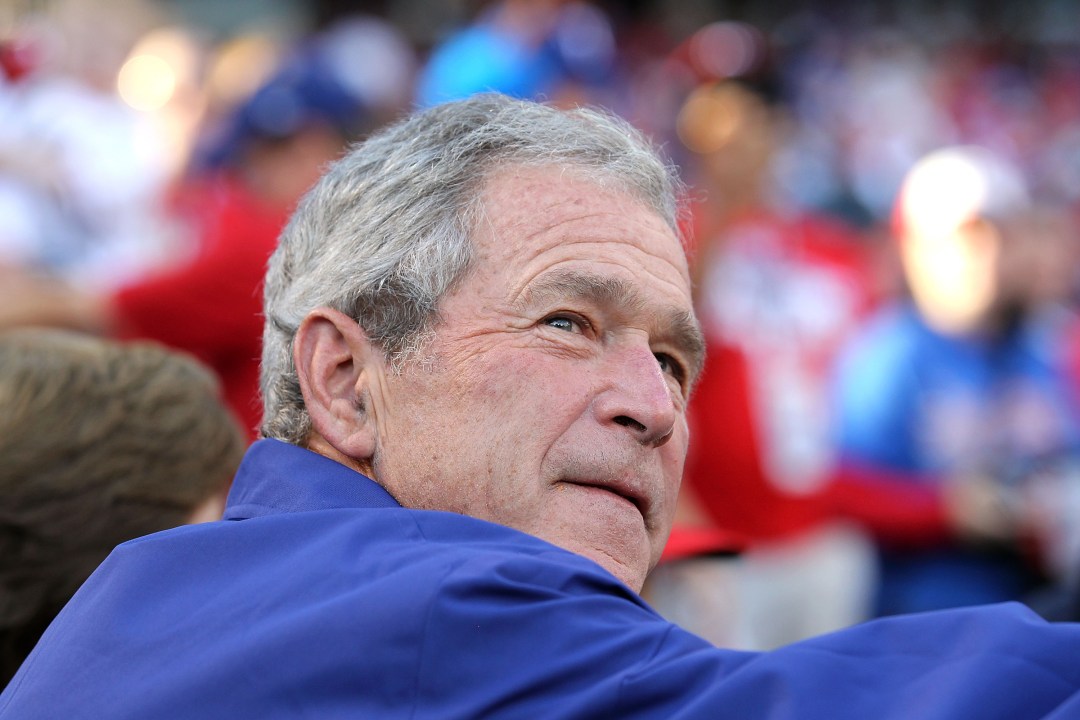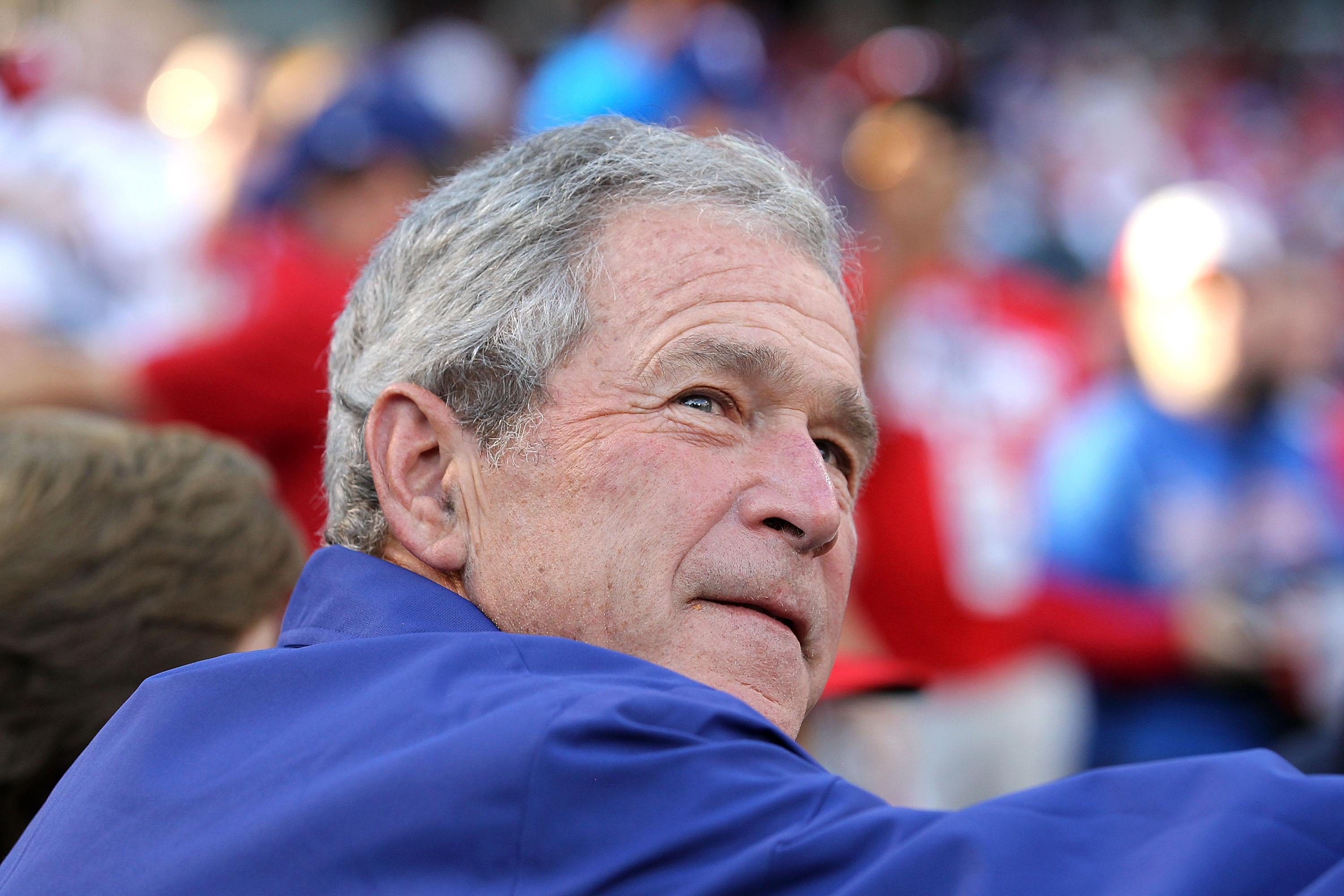 Number 43 is back. And judging by his interview (£) with the Times editor James Harding – and that paper’s serialisation (£) of his memoirs – he is standing defiant. As Bush himself puts it to his critics, “I ask those
people to read the book. I understand that the filter can be harsh. But I think people will see someone who deliberated carefully on key issues, someone who did not sell his soul for politics, that
he was willing to stand on principle and people can draw their own conclusions.”
Number 43 is back. And judging by his interview (£) with the Times editor James Harding – and that paper’s serialisation (£) of his memoirs – he is standing defiant. As Bush himself puts it to his critics, “I ask those
people to read the book. I understand that the filter can be harsh. But I think people will see someone who deliberated carefully on key issues, someone who did not sell his soul for politics, that
he was willing to stand on principle and people can draw their own conclusions.”
“The book” is out tomorrow, so we will be able to draw our own conclusions then. But, in the meantime, here’s a selection of extracts from the first part of the Times serialisation. The second part will come tomorrow, and cover 9/11, Blair and Katrina.
1) Iraq as Vietnam. “The security situation continued to deteriorate over the summer. Iraq was becoming a magnet for extremists. Their strategy was to present an image of Iraq as hopeless and unwinnable, swinging American public opinion against the war and forcing us to withdraw as we had in Vietnam. To an extent, they succeeded. It was difficult for the average American to differentiate the twisted terrorists from the millions of ordinary Iraqis who were grateful for liberation.”
2) Wrong, but not lying, over WMDs. “The left trotted out a new mantra: “Bush Lied, People Died.” The charge was illogical. If I wanted to mislead the country into war, why would I pick an allegation that was certain to be disproven ? The charge was also dishonest. Members of the previous administration and the vast majority of Congress had read the same intelligence and concluded Iraq had WMD. So had intelligence agencies around the world. Nobody was lying. We were all wrong.”
3) The surge as the turning point in Iraq. “As our surge troops flowed in, Generals Petraeus and [General Ray] Odierno [his deputy] relocated our forces from bases on the outskirts of Baghdad to small outposts inside the city. Our troops lived alongside Iraqi security forces and patrolled the city on foot. The extremists fought back.
We lost 81 troops in February, 81 in March, 104 in April, 126 in May, and 101 in June — the first time we had faced triple-digit losses three months in a row. The casualties were agonizing. But something felt different in 2007: America was on the offense again.
By the time the surge ended in the summer of 2008, violence in Iraq had dropped to the lowest level since the first year of the war. Iraqi forces were preparing to take responsibility for
security in a majority of provinces.”
4) Authorising waterboarding. “I took a look at the list of techniques. There were two that I felt went too far. Another technique was waterboarding, a process of simulated
drowning. No doubt the procedure was tough, but medical experts assured the CIA that it did no lasting harm.
I knew that an interrogation program this sensitive would one day become public. I would have preferred that we get the information another way. But the choice between security and values was real. Had I not authorized waterboarding on senior al-Qaeda leaders, I would have had to accept a greater risk that the country would be attacked. I approved the use of the interrogation techniques.
They proved highly effective. Zubaydah revealed information on al-Qaeda’s structure and operations. He also provided leads that helped reveal the location of Ramzi bin al Shibh, the logistical planner of the 9/11 attacks. The Pakistani police picked him up on the first anniversary of 9/11.
Zubaydah later explained why he started answering questions again. His understanding of Islam was that he had to resist only up to a certain point. Waterboarding was the technique that allowed
him to reach that threshold, fulfil his religious duty, then cooperate.”
5) Waterboarding Khalid Sheikh Mohammed. “Tenet asked if he had permission to use enhanced interrogation techniques, including waterboarding, on Khalid Sheikh Mohammed. I
thought about my meeting with Danny Pearl’s widow. I thought about the 2,973 people stolen from their families by al-Qaeda on 9/11. And I thought about my duty to protect the country. ‘Damn
right,’ I said.”
6) The final tally. “Of the thousands of terrorists we captured in the years after 9/11, about a hundred were placed into the CIA program. About a third of those were questioned using enhanced techniques. Three were waterboarded.
The information the detainees revealed constituted more than half of what the CIA knew about al-Qaeda. Their interrogations helped break up plots to attack American military and diplomatic
facilities abroad, Heathrow Airport and Canary Wharf in London, and multiple targets in the United States.”
7) Quitting drinking. “Quitting drinking was one of the toughest decisions I have ever made. Without it, none of the others in this book would have been possible. Yet without the
experiences of my first 40 years, quitting drinking would not have been possible either. So much of my character, so many of my convictions, took shape during those first four decades. On top of
that, it was one interesting ride.”
8) The situation in Afghanistan. “As I write in 2010, the war in Afghanistan continues. The Taliban remain active, and the Afghan government is struggling to gain full control of its country. From the beginning, I knew it would take time to help the Afghan people build a functioning democracy consistent with its culture and traditions. The task turned out to be even more daunting than I anticipated. Our government was not prepared for nation building. Over time, we adapted our strategy and our capabilities. Still, the poverty in Afghanistan is so deep, and the infrastructure is so lacking, that it will take many years to complete the work.”
9) Killing goldfish. “As I got older, I came to see that my parents’ love was unconditional. I know because I tested it. I had two car wrecks when I was 14, the legal driving age back then. My parents still loved me. I borrowed Dad’s car, carelessly charged in reverse, and tore the door off. I poured vodka in the fishbowl and killed my little sister Doro’s goldfish. At times I was surly, demanding, and brash.”
10) And one from Bush’s interview with James Harding (revealed before now, but worth repeating). “The most interesting — the only interesting — footnote in the book gives the final result of a competition he had with Karl Rove, his chief political adviser, to see who could read the most history books in one year. Mr Rove won, but only just: ‘The final tally was 110 to 95 in books, 40,347 to 37,343 in pages and 2,275,297 to 2,032,083 in total square inches.'”







Comments